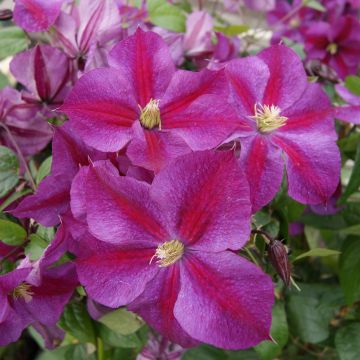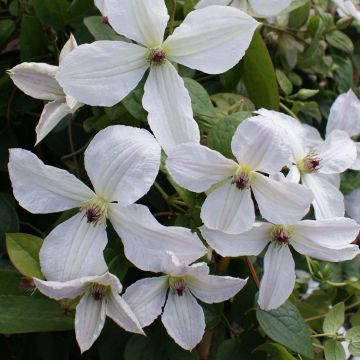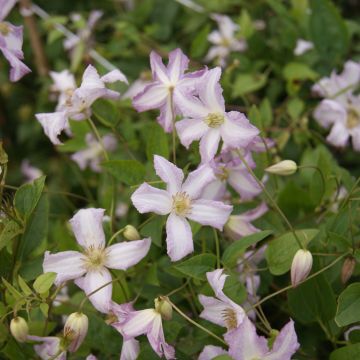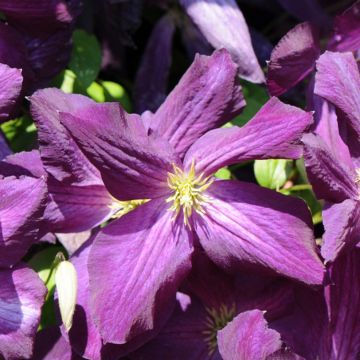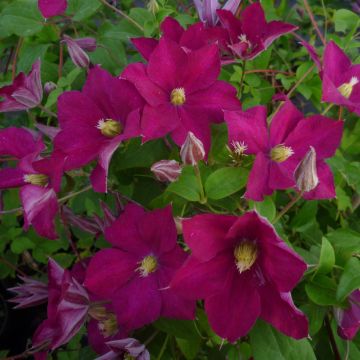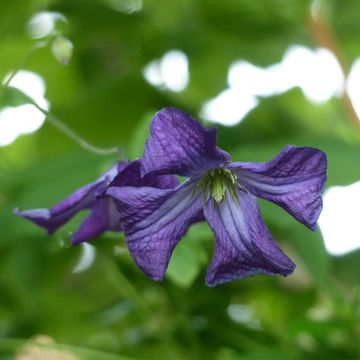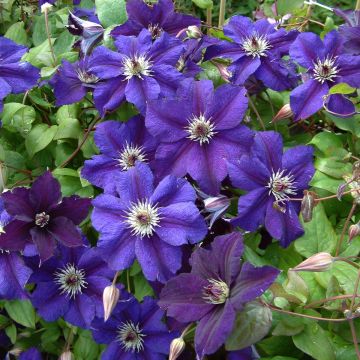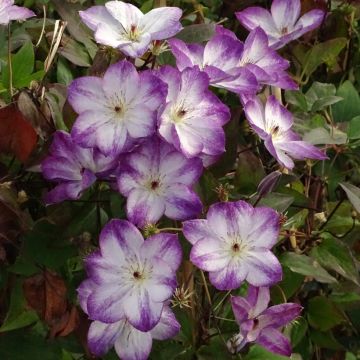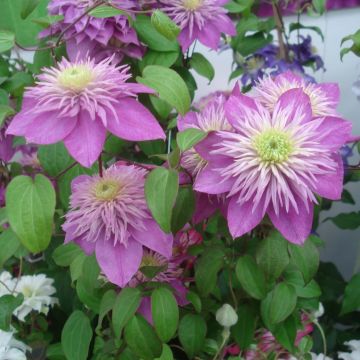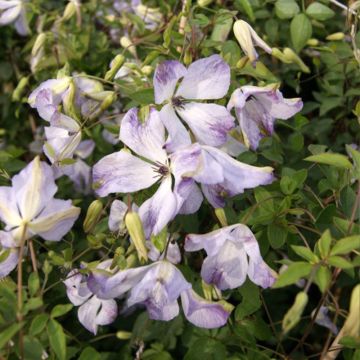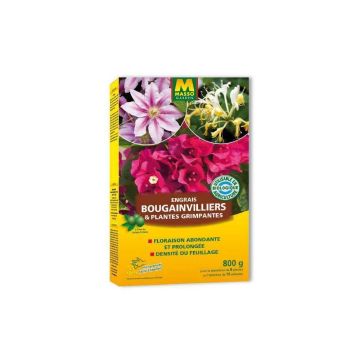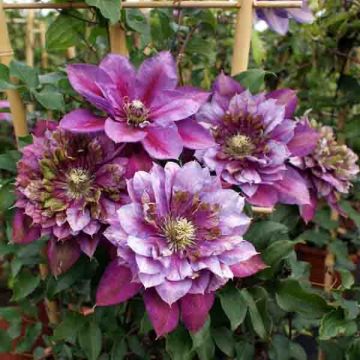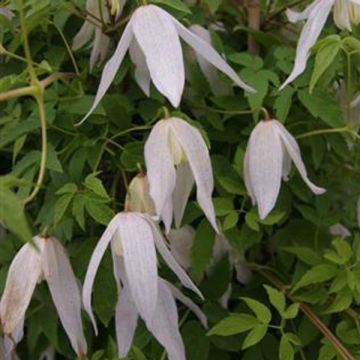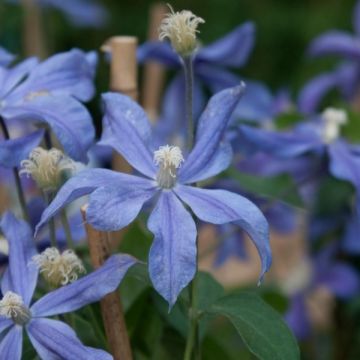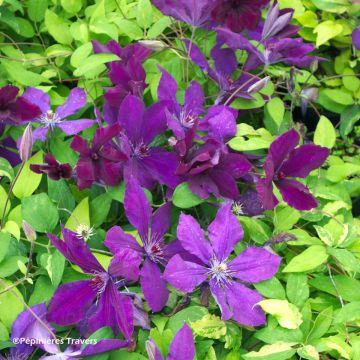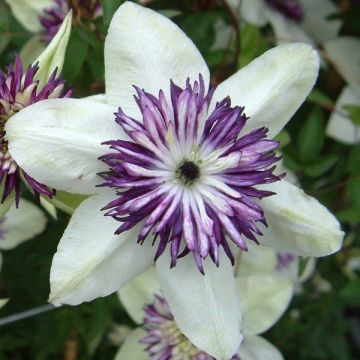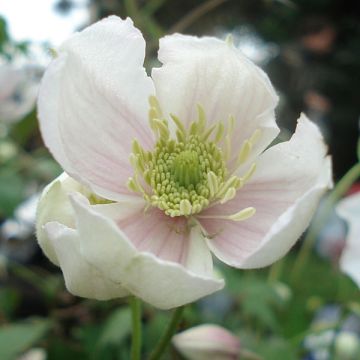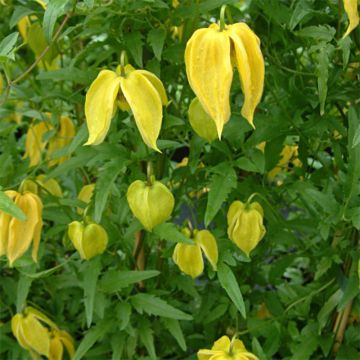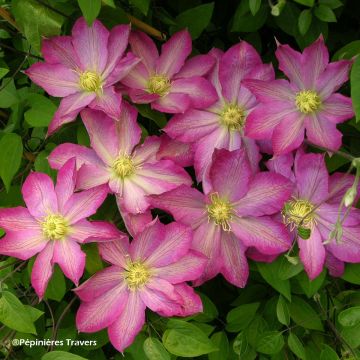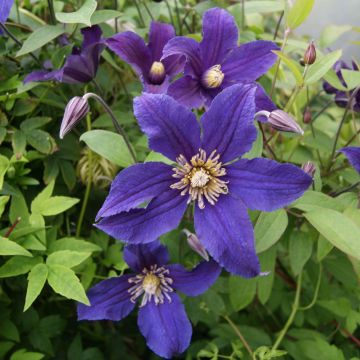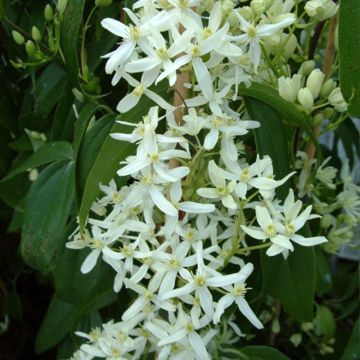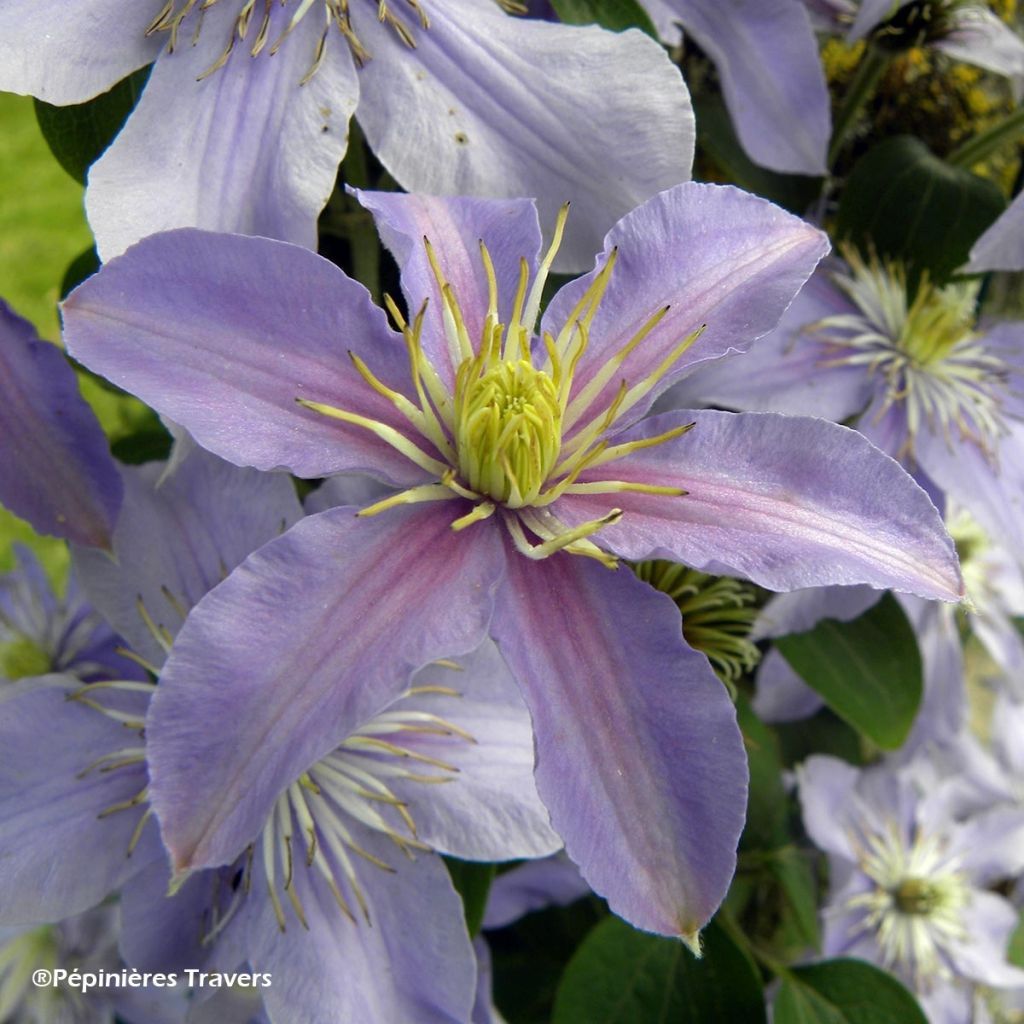

Clematis viticella Justa
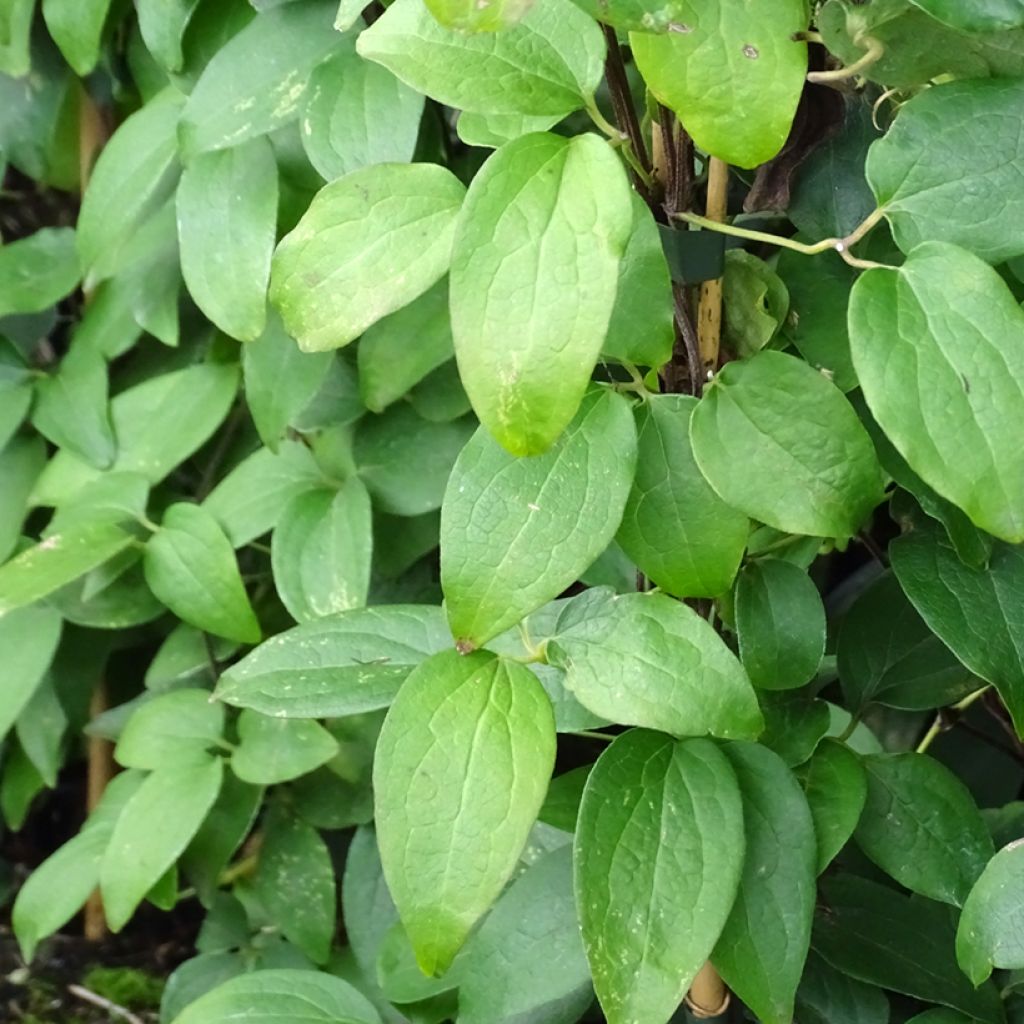

Clematis viticella Justa
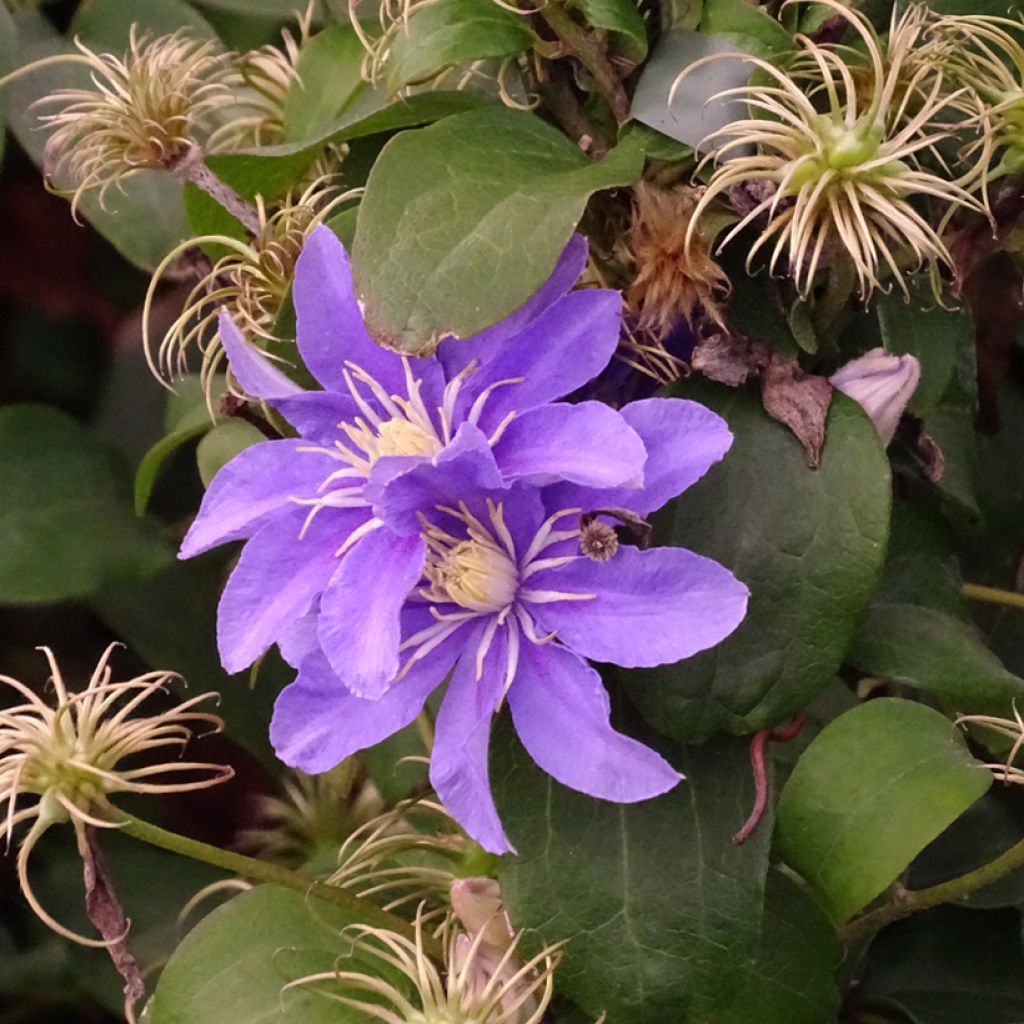

Clematis viticella Justa
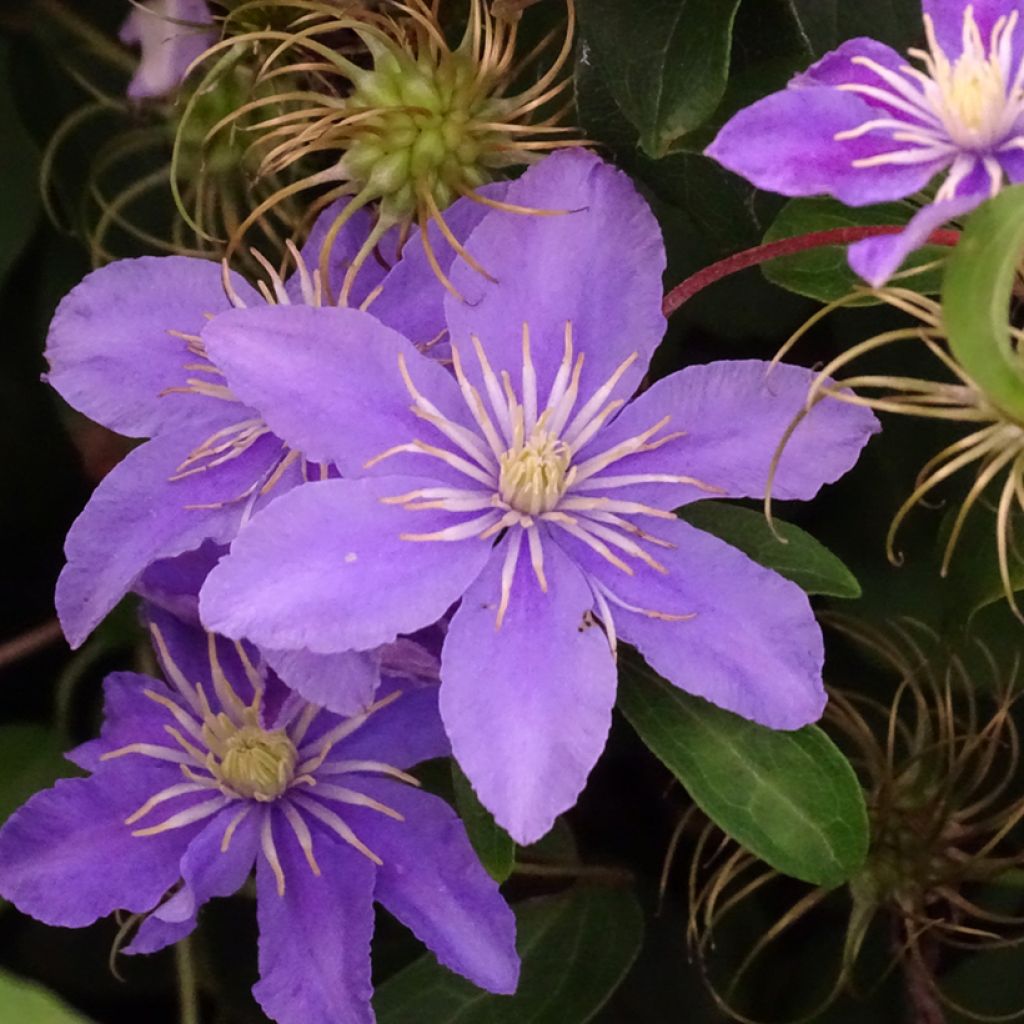

Clematis viticella Justa
Clematis viticella Justa
Clematis viticella Justa
This item cannot be shipped to the selected country
Delivery charge from €5.90
More information
Schedule delivery date,
and select date in basket
This plant carries a 6 months recovery warranty
More information
We guarantee the quality of our plants for a full growing cycle, and will replace at our expense any plant that fails to recover under normal climatic and planting conditions.
From €5.90 for pickup delivery and €6.90 for home delivery
Express home delivery from €8.90.
Does this plant fit my garden?
Set up your Plantfit profile →
Description
Clematis 'Justa' is a hybrid resulting from cross-breeding with the Italian clematis. It has inherited its abundant late flowering, which extends throughout the summer season. From June until September, bright blue-violet star-shaped flowers appear, with pinkish-purple midribs fading as they lighten to lavender-blue. Each flower is crowned with a generous bunch of yellow-green stamens that turn white, adding to its simple charm. It is a fairly compact variety, with rapid growth and medium development, suitable for planting in the ground to fill shrub beds or hedges, as well as for container planting on patios or balconies.
The 'Justa' cultivar is a Lithuanian creation from 1988 resulting from multiple cross-breeding with Clematis viticella, also known as Italian clematis. Its parent is a deciduous climbing or trailing vine that belongs to the Ranunculaceae family, and is often characterised by its small, single flowers with 4 sepals. Like most of its cousins, it prefers light, deep, moist, and fertile soil that is preferably neutral. It enjoys a sunny or partially shaded position, with its base always in shade. It resists cold temperatures and is not afraid of frost, even if prolonged. However, it does not tolerate stagnant humidity, so the substrate must be well-drained and watering should be moderate (if necessary, during the first year). It can be grown in a container if the pot is large enough (minimum 60cm (24in) in diameter.
'Justa' can spread up to 2m (7ft) in all directions. It is a Group 3 clematis, which includes late-flowering species that bloom on new growth. This group includes large-flowered climbing clematis that bloom from July to September, small-flowered climbing clematis that bloom between June and October, and non-climbing herbaceous clematis that bear flowers between July and October. 'Justa' falls into the category of small-flowered clematis, along with other Italian clematis varieties. Its flowers, initially single stars, are normally composed of 6 to 8 coloured tepals, with a diameter of 6 to 8cm (2 to 3in). They are elliptical, acuminate, and delicately undulate at the margin, slightly overlapping at their base. The variety bears a generous bunch of very long stamens, which are initially yellow-green before later turning white. Fruits will appear afterwards, decorating the foliage until winter. The deciduous and bright green leaves are composed of 3 to 5 leaflets. They are borne on tendrils, which wrap around their support.
Clematis benefit from the proximity of other plants that help drain the soil while protecting their base from drying out. Plant spring bulbs and a few ground-cover perennials such as geraniums or dead nettles at its base, and enjoy the show with minimal maintenance. If you have a larger space, this clematis can climb on shrubs or up a column, adding verticality to a colourful flower bed. Climbing clematis are also the best companions for roses. The very light flowers of the 'Justa' clematis will look even more beautiful in a shaded position or against a background with dark foliage.
Report an error about the product description
Clematis viticella Justa in pictures
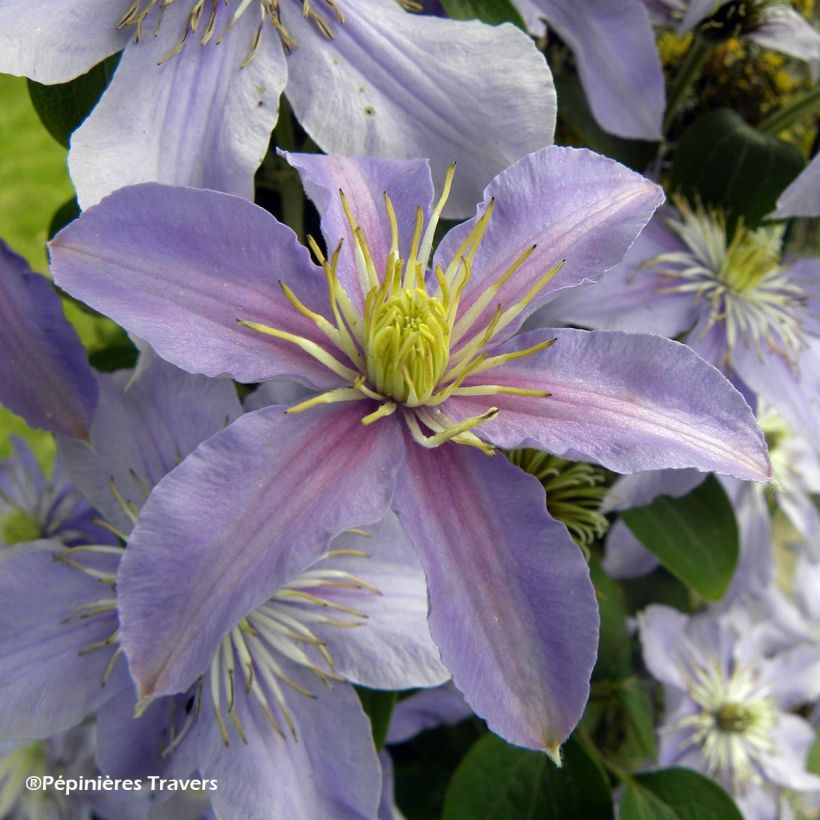

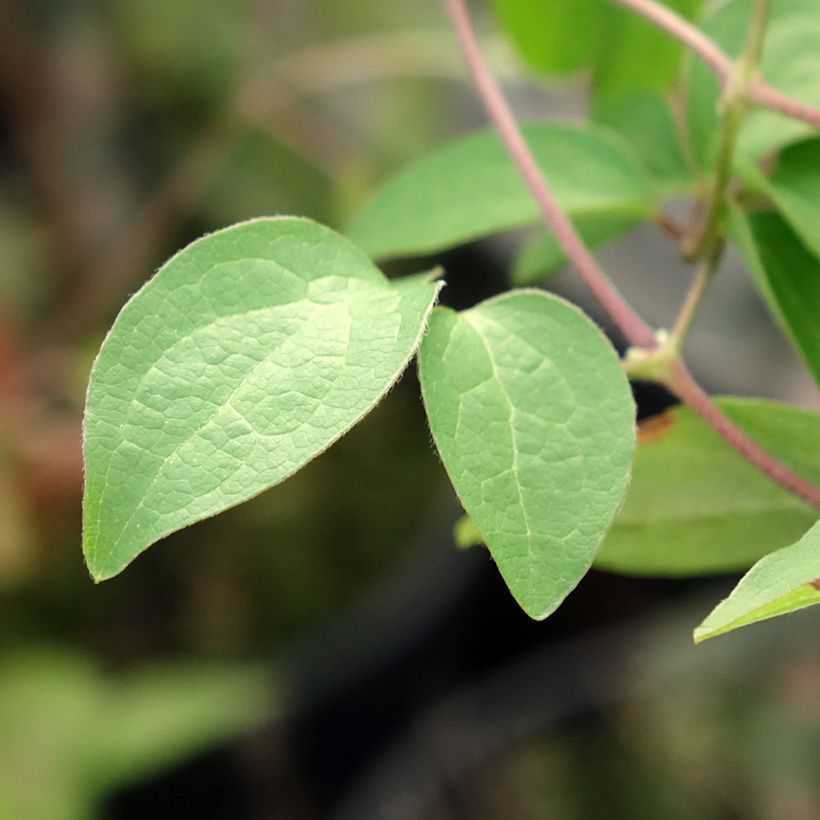



Plant habit
Flowering
Foliage
Botanical data
Clematis
viticella
Justa
Ranunculaceae
Cultivar or hybrid
Other Clematis Viticella
Planting and care
Plant in spring or autumn. It prefers moderately moist but not waterlogged soil that is deep, well-cultivated, drained, and rich. Plant at a depth of 5cm (2in), with the root ball placed diagonally or even lying on the ground. The head should be in the sun (or partial shade) and the base in the shade. You can place a flat tile in front of the stump or use ground cover plants to provide the necessary shade. Cover the foot with a small mound of soil to encourage the emergence of new shoots. After planting, cut the stems back to 30cm (12in) from the base, above a pair of buds.
Train them loosely to help the plant cling on its own.
Planting period
Intended location
Care
This item has not been reviewed yet - be the first to leave a review about it.
Clematis
Haven't found what you were looking for?
Hardiness is the lowest winter temperature a plant can endure without suffering serious damage or even dying. However, hardiness is affected by location (a sheltered area, such as a patio), protection (winter cover) and soil type (hardiness is improved by well-drained soil).

Photo Sharing Terms & Conditions
In order to encourage gardeners to interact and share their experiences, Promesse de fleurs offers various media enabling content to be uploaded onto its Site - in particular via the ‘Photo sharing’ module.
The User agrees to refrain from:
- Posting any content that is illegal, prejudicial, insulting, racist, inciteful to hatred, revisionist, contrary to public decency, that infringes on privacy or on the privacy rights of third parties, in particular the publicity rights of persons and goods, intellectual property rights, or the right to privacy.
- Submitting content on behalf of a third party;
- Impersonate the identity of a third party and/or publish any personal information about a third party;
In general, the User undertakes to refrain from any unethical behaviour.
All Content (in particular text, comments, files, images, photos, videos, creative works, etc.), which may be subject to property or intellectual property rights, image or other private rights, shall remain the property of the User, subject to the limited rights granted by the terms of the licence granted by Promesse de fleurs as stated below. Users are at liberty to publish or not to publish such Content on the Site, notably via the ‘Photo Sharing’ facility, and accept that this Content shall be made public and freely accessible, notably on the Internet.
Users further acknowledge, undertake to have ,and guarantee that they hold all necessary rights and permissions to publish such material on the Site, in particular with regard to the legislation in force pertaining to any privacy, property, intellectual property, image, or contractual rights, or rights of any other nature. By publishing such Content on the Site, Users acknowledge accepting full liability as publishers of the Content within the meaning of the law, and grant Promesse de fleurs, free of charge, an inclusive, worldwide licence for the said Content for the entire duration of its publication, including all reproduction, representation, up/downloading, displaying, performing, transmission, and storage rights.
Users also grant permission for their name to be linked to the Content and accept that this link may not always be made available.
By engaging in posting material, Users consent to their Content becoming automatically accessible on the Internet, in particular on other sites and/or blogs and/or web pages of the Promesse de fleurs site, including in particular social pages and the Promesse de fleurs catalogue.
Users may secure the removal of entrusted content free of charge by issuing a simple request via our contact form.
The flowering period indicated on our website applies to countries and regions located in USDA zone 8 (France, the United Kingdom, Ireland, the Netherlands, etc.)
It will vary according to where you live:
- In zones 9 to 10 (Italy, Spain, Greece, etc.), flowering will occur about 2 to 4 weeks earlier.
- In zones 6 to 7 (Germany, Poland, Slovenia, and lower mountainous regions), flowering will be delayed by 2 to 3 weeks.
- In zone 5 (Central Europe, Scandinavia), blooming will be delayed by 3 to 5 weeks.
In temperate climates, pruning of spring-flowering shrubs (forsythia, spireas, etc.) should be done just after flowering.
Pruning of summer-flowering shrubs (Indian Lilac, Perovskia, etc.) can be done in winter or spring.
In cold regions as well as with frost-sensitive plants, avoid pruning too early when severe frosts may still occur.
The planting period indicated on our website applies to countries and regions located in USDA zone 8 (France, United Kingdom, Ireland, Netherlands).
It will vary according to where you live:
- In Mediterranean zones (Marseille, Madrid, Milan, etc.), autumn and winter are the best planting periods.
- In continental zones (Strasbourg, Munich, Vienna, etc.), delay planting by 2 to 3 weeks in spring and bring it forward by 2 to 4 weeks in autumn.
- In mountainous regions (the Alps, Pyrenees, Carpathians, etc.), it is best to plant in late spring (May-June) or late summer (August-September).
The harvesting period indicated on our website applies to countries and regions in USDA zone 8 (France, England, Ireland, the Netherlands).
In colder areas (Scandinavia, Poland, Austria...) fruit and vegetable harvests are likely to be delayed by 3-4 weeks.
In warmer areas (Italy, Spain, Greece, etc.), harvesting will probably take place earlier, depending on weather conditions.
The sowing periods indicated on our website apply to countries and regions within USDA Zone 8 (France, UK, Ireland, Netherlands).
In colder areas (Scandinavia, Poland, Austria...), delay any outdoor sowing by 3-4 weeks, or sow under glass.
In warmer climes (Italy, Spain, Greece, etc.), bring outdoor sowing forward by a few weeks.

































